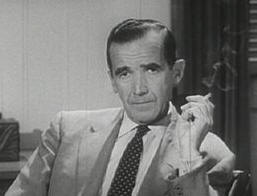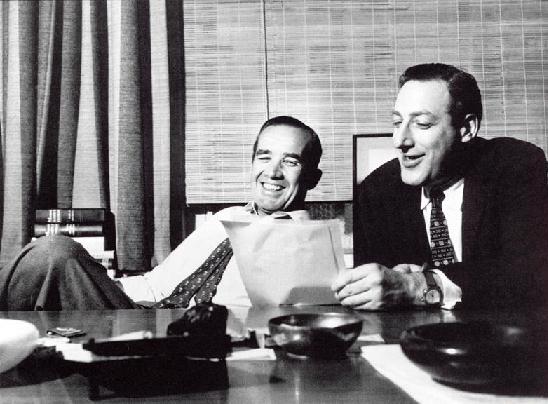Edward R Murrow
dr george pollard
The Ideal Journalist
Edward R. Murrow (1908-1965) founded the occupation of broadcast journalism, that is, radio, television and, these days, cable news. He was the ideal, in his time, and, today, is the hope for the future. Egbert Roscoe Murrow, the "Ed" was assumed while working lumber camps, as a teenager, in the middle 1920s, talked the talk and walked the walk.
A liberal democracy is based on the idea that the free expression of ideas, by all who wish, benefits everyone, except tyrants, and pushes us toward a better future. John Milton best expressed this idea in "Areopagitica," in 1644. Journalism is the vehicle of free expression, and Milton the author of its founding document.



To the detriment of most current practitioners, Edward R. Murrow raised the bar for journalism. The basic principle of broadcast journalism, he believed, was to extend the role of the daily newspaper. The job of all news media was to set the agenda of what listeners or readers might think about and provide relevant facts to help them think fully and make reasonable decisions. The technology of broadcast journalism had the advantage of immediacy, hear or see it now.
Murrow, in thought and action, upheld that principle, even when money was involved. Effective journalism calls for integrity, dignity and, as the facts allow, impartiality. Advertising, with its well-honed, highly-specific and anti-social vested interests can't interfere, where the general good is at stake. As Michael Moore might say, shareholders have no bill of rights.



Murrow, as head of CBS News and hosted of some of its top shows, successfully battled the influence of advertisers, along with Fred W. Friendly (1915-1998). They also battled other social evils, winning more often than not. George Clooney and Grant Heslov, effectively, if almost too commercially, convey, in "Good Night, and Good Luck," the essence of the Murrow and Friendly battle against McCarthyism. The portrayal of Murrow, by David Strathairn (above), is eerily close, to boot.



In the late 1940s, the junior US Senator from Wisconsin, Joseph R. >McCarthy, a callous, mindless man, began a witch hunt for "Communists." He claimed, without fact or reasoned speculation, that Communists were hidden in every nook and cranny of the fabric and structure, of the USA. Few Communists were rooted out, but countless lives were destroyed. Murrow and Friendly (above, right) took up the cause in early 1953.
Ferdinand Wachenheimer grew up in Providence, RI. He became Fred Friendly for his first radio job, in 1938. After serving in WWII, he joined Murrow, at CBS, in 1948. From 1964 to 1966, he was president of CBS news, resigning, on principle, when the network decided to air re-runs of "I Love Lucy," instead of the first Senate hearings on Vietnam.
Two-time CBS News President, Dick Salant (1914-1993), wrote that after Murrow, who had absolute and direct contact with CBS CEO, William S. Paley (1901-1990), and CBS President, Dr. Frank Stanton (1908-2006), a new layer of bureaucratic insulation was added. Friendly and Salant, who preceded and succeeded Friendly, reported to CBS Broadcast Group President, Jack Schneider (b. 1926), a former CBS Television salesperson. The indirect route, Friendly to Schneider to Stanton to Paley and back, delayed a crucial and timely decision, forcing Friendly to resign, in 1966.
After CBS, Friendly created Public Access Television (PAT). He was instrumental in the founding of the Public Broadcasting System (PBS) and an influential advisor to the Ford Foundation. Later, he accepted the inaugural appointment as Edward R. Murrow Professor of Broadcast Journalism, at Columbia University.
Starting in 1951, Murrow was hosting "See It Now," on the CBS television network. Tens of millions watched each week. On "Good Tuesday," 9 March 1953, Murrow and Friendly showed, with limited comment, McCarthy in action. They let the senator speak for himself, and the scaffolding of McCarthyism creaked under its own immense weight.



The Murrow credibility derived from wartime reporting on roof tops in London, England, and the superb staff of broadcast journalists he hired to report World War Two. This was the first living room war, as CBS, lead by Murrow, brought details and events of the War into the homes of Americans, as they ate dinner. Murrow reported, accompanied by the sound of bombs striking London. He flew bombing missions over Germany, describing the destruction from a few thousand fee in the air. When he said, "hear it now," he meant it and the effect was shuddering.
By the early 1950s, Murrow was a major social force, a star. He believed television should make the same demands of viewers as books do of readers, and wasn't afraid to say it, out loud. This was the basic assumption of "See It Now" and, later, "CBS Reports." His audiences grew and grew and grew, the more he demanded.
Viewers trusted Murrow, without question. Only Walter Cronkite holds the trust of America to the extent Murrow did; Oprah pales in comparison. For Cronkite and Murrow, the responsibility is taken seriously and burden welcome.
Viewer trust and taking it seriously provided Murrow, along with Friendly, the credibility and confidence to challenge McCarthy. Even the President of the United States dared not confront the junior Senator from Wisconsin. In a more practical sense, his CBS contract gave Murrow final say on the content of his shows.
McCarthy was his own executioner. Invoking the "Equal Time" provision of US broadcast regulation, which allowed him to reply to the the "See It Now" episode, McCarthy choose to appear on 6 April 1953. The "Age of Suspicion," in the USA, ended that night. McCarthyism failed to meet the challenge of the medium, that is, truth, and the counter rebuttal by Murrow.
The creaking, of McCarthyism, turned to collapse. The 6 April 1953 episode of "See It Now" lead directly to the Army-McCarthy Hearings, held by the US Congress, which censured McCarthy. Ostracized, McCarthy sank further into substance abuse, "he'd always been a heavy drinker," said journalist Richard Roevre, passing away on 2 May 1957 from acute hepatitis.
The Radio Television News Directors Association (RTNDA) honoured Murrow, on Wednesday, 25 October 1958. His speech, of appreciation, was a prescient comment on media use and misuse. Television, he extolled, could expose viewers to new ideas or under-standing. It could, he warned, compel viewers to buy, not only the advertised products, which supported content, but ill-advised ideas or policies and effete, incompetent or self-serving leaders. All the latter seem realized, but few of the former. After reading his words, you'll know the journey, path and destination might have been different. Click here to read the full text, of "Look Now, Pay Later."
In 1961, at the request of President John F. Kennedy, Murrow left CBS to head the United Stated Information Agency (USIA). This was the official story.



In fact, it seems, lung cancer caught up with Murrow, a life-long chain smoker, who went through two or three packages of cigarettes a day, and the CBS News grind was too much. He resigned from USIA, in 1964, and passed away on 27 April 1965, at age 57. In his brief life, Edward R. Murrow, showed what was possible, that truth will out and greedy abuse, social or economic, is can't win if women and men of integrity speak out against it. More than 1,200 women, men and children attended his funeral.
At 8:30 pm, on 30 April, CBS aired a 60-minute tribute, "An Hour with Ed Murrow," hosted by Robert Trout. Click here to listen to the audio of the CBS tribute to Edward R. Murrow.
dr george pollard is a Sociometrician and Social Psychologist at Carleton University, in Ottawa, where he currently conducts research and seminars on "Media and Truth," Social Psychology of Pop Culture and Entertainment as well as umbrella repair.
- Chuck Azzarello
- J Scott Fuqua
- Rick Rosner
- Love, Lust and Loss
- Howard Lapides Triplet
- Lisa Jay
- Larry Glick, was 86
Click above to tell a friend about this article.
Recommended
- David Simmonds
- Wristwatch Jungle
- Entry for 1 May 2025
- Personal Grooming

- Sjef Frenken
- Point of Entry
- Serving Dogs and Cats
- A Code for the Road

- Jennifer Flaten
- Love is in the Air
- Tom Petty
- Movie Tears

- M Alan Roberts
- Wake Up or be Killed
- Parental Epiphany
- Please Eat Me

Recommended
- Matt Seinberg
- Loving Autumn
- Memorial Day
- Sock Phobia

- Streeter Click
- Grub Street Philosophy: 2
- WBZ, 10 January 1973
- Content Submission

Recommended
- AJ Robinson
- My Memorial Day
- Threads Weaving Together
- A Bad Comparison

- Jane Doe
- Ted 2
- Del Shannon "Runaway"
- Ex Machina

- M Adam Roberts
- Essence of a New Day
- Humble Pie
- Is She the One?

- Ricardo Teixeira
- Harmony
- The Future
- There is a Light




